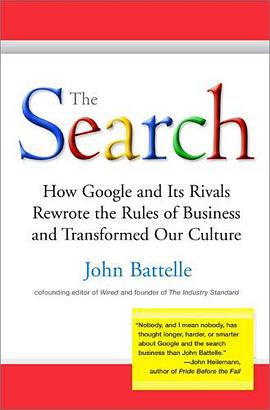The Search 豆瓣
作者:
John Battelle
Portfolio Hardcover
2005
- 8
What does the world want? According to John Battelle, a company that answers that question -- in all its shades of meaning -- can unlock the most intractable riddles of both business and culture. And for the past few years, that's exactly what Google has been doing.
Jumping into the game long after Yahoo, Alta Vista, Excite, Lycos, and other pioneers, Google offered a radical new approach to search, redefined the idea of viral marketing, survived the dotcom crash, and pulled off the largest and most talked about initial public offering in the history of Silicon Valley.
But The Search offers much more than the inside story of Google's triumph. It's also a big-picture book about the past, present, and future of search technology, and the enormous impact it is starting to have on marketing, media, pop culture, dating, job hunting, international law, civil liberties, and just about every other sphere of human interest.
More than any of its rivals, Google has become the gateway to instant knowledge. Hundreds of millions of people use it to satisfy their wants, needs, fears, and obsessions, creating an enormous artifact that Battelle calls "the Database of Intentions." Somewhere in Google's archives, for instance, you can find the agonized research of a gay man with AIDS, the silent plotting of a would-be bombmaker, and the anxiety of a woman checking out her blind date. Combined with the databases of thousands of other search-driven businesses, large and small, it all adds up to a goldmine of information that powerful organizations (including the government) will want to get their hands on.
No one is better qualified to explain this entire phenomenon than Battelle, who cofounded Wired and founded The Industry Standard. Perhaps more than any other journalist, he has devoted his career to finding the holy grail of technology -- something as transformational as the Macintosh was in the mid- 1980s. And he has finally found it in search.
Battelle draws on more than 350 interviews with major players from Silicon Valley to Seattle to Wall Street, including Google cofounders Larry Page and Sergey Brin and CEO Eric Schmidt, as well as competitors like Louis Monier, who invented AltaVista, and Neil Moncrief, a soft-spoken Georgian whose business Google built, destroyed, and built again.
Battelle lucidly reveals how search technology actually works, explores the amazing power of targeted advertising, and reports on the frenzy of the Google IPO, when the company tried to rewrite the rules of Wall Street and declared "don't be evil" as its corporate motto.
For anyone who wants to understand how Google really succeeded -- and the implications of a world in which every click can be preserved forever -- THE SEARCH is an eye-opening and indispensable read.
Jumping into the game long after Yahoo, Alta Vista, Excite, Lycos, and other pioneers, Google offered a radical new approach to search, redefined the idea of viral marketing, survived the dotcom crash, and pulled off the largest and most talked about initial public offering in the history of Silicon Valley.
But The Search offers much more than the inside story of Google's triumph. It's also a big-picture book about the past, present, and future of search technology, and the enormous impact it is starting to have on marketing, media, pop culture, dating, job hunting, international law, civil liberties, and just about every other sphere of human interest.
More than any of its rivals, Google has become the gateway to instant knowledge. Hundreds of millions of people use it to satisfy their wants, needs, fears, and obsessions, creating an enormous artifact that Battelle calls "the Database of Intentions." Somewhere in Google's archives, for instance, you can find the agonized research of a gay man with AIDS, the silent plotting of a would-be bombmaker, and the anxiety of a woman checking out her blind date. Combined with the databases of thousands of other search-driven businesses, large and small, it all adds up to a goldmine of information that powerful organizations (including the government) will want to get their hands on.
No one is better qualified to explain this entire phenomenon than Battelle, who cofounded Wired and founded The Industry Standard. Perhaps more than any other journalist, he has devoted his career to finding the holy grail of technology -- something as transformational as the Macintosh was in the mid- 1980s. And he has finally found it in search.
Battelle draws on more than 350 interviews with major players from Silicon Valley to Seattle to Wall Street, including Google cofounders Larry Page and Sergey Brin and CEO Eric Schmidt, as well as competitors like Louis Monier, who invented AltaVista, and Neil Moncrief, a soft-spoken Georgian whose business Google built, destroyed, and built again.
Battelle lucidly reveals how search technology actually works, explores the amazing power of targeted advertising, and reports on the frenzy of the Google IPO, when the company tried to rewrite the rules of Wall Street and declared "don't be evil" as its corporate motto.
For anyone who wants to understand how Google really succeeded -- and the implications of a world in which every click can be preserved forever -- THE SEARCH is an eye-opening and indispensable read.
